It was January 25, 2001. We were providing the finishing touches to the Ahmedabad edition of The Indian Express. As I was leaving office, I waved at my colleagues, saying, “We shall meet on January 27, after Republic Day”--—one of the rare holidays for newspapers—“unless something earth-shaking takes place”.
Trauma Of The Bhuj Earthquake That Lasts To This Day
21 years ago, on the morning of Republic Day, residents of Bhuj woke up to an earth-shattering disaster that took nearly 20,000 lives

Tragically, it did. As we lay in our beds, a rattling sound preceded a violent shaking of the building with sounds of utensils falling off shelves as ceiling fans swayed like pendulums. As we scurried out without wasting any time, we saw a building across our housing society crumble in a thick cloud of dust. It did not take long for us to realise the enormity of the earthquake that had struck the region. I called Shekhar Gupta, the then editor-in-chief of the paper, briefed him of the seriousness of the situation and sought permission to bring out the edition on a holiday. He agreed. I got in touch with our general manager, Shrenik Mehta, and we decided to meet in office. As we began calling colleagues, we were relieved to find that all were safe, even though some reported cracks in their buildings.
With little access to social media and limited electronic media which was disrupted due to power failures, we learnt of the massive damage to property and loss of lives. We dispatched our reporters to different parts of the city and kept calling reporters across Gujarat for updates.
By late afternoon, we were able to print a four-page special pull-out giving information about the extent of damage in the city; the copies were lapped up by news-hungry residents even as rumours abounded with claims of thousands of deaths. By the next day, we learnt that the epicentre of the earthquake was near Bhuj, although no news came from there. We were constantly in touch with the Indian Air Force and were informed that the airfield at Bhuj was damaged. A day later, the air force agreed to take Janyala Sreenivas, one of our reporters, to Bhuj by chopper. It was only then that we started getting authentic information from the worst-affected area. In the meantime, the rumour mills were working full time, with some sections of the media putting the death toll at above a lakh (the final official figure was about 20,000 killed and 1.6 lakh injured).
As the country and the world learnt of the enormity of the situation, relief started pouring in. Since Ahmedabad was the closest international airport, aircraft carrying relief materials, food grains and even sniffer dogs arrived from within the country and outside. Although the then state government’s efforts were insufficient, volunteers from social and religious organisations rushed to Bhuj to help in rescue and relief efforts. Incidentally, Narendra Modi, who was the Bharatiya Janata party’s general secretary at the time, led the party’s
relief missions, assisted by J.P. Nadda, now the party president.
While Bhuj town bore the brunt of—and had been almost levelled by—the earthquake, several other smaller towns in the vicinity also suffered extensive damage. Stories filed by journalists reporting from the worst-affected areas were heartrending. For instance, there was a report about schoolchildren who had gathered for the Republic Day parade, all of whom perished as the school building came crashing down. There were several stories about people rescued alive from under the rubble after days and many families looking for their loved ones, hoping against hope. Then there were the human interest stories of heroism and people helping generously in the hour of need. It took several weeks to bring the situation under control and several months to rehabilitate those who had lost almost everything in the earthquake.
The recent earthquakes in Syria and Turkiye are stark reminders of the tragedy in Bhuj and other parts of Gujarat: the casualties, the irreparable losses suffered by residents and the stories of those who assisted in rescue and relief operations under the most trying circumstances.
(This appeared in the print edition as "A Seismic Calamity")
(Views expressed are personal)
Vipin Pubby is an independent journalist and former resident editor of the Gujarat edition of the Indian Express
- Previous Story
 Marital Rape 'A Social Issue Not Legal', Centre Files Affidavit With SC Against Criminalisation
Marital Rape 'A Social Issue Not Legal', Centre Files Affidavit With SC Against Criminalisation - Next Story
























